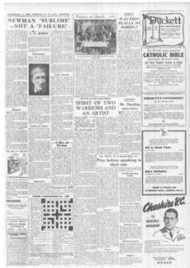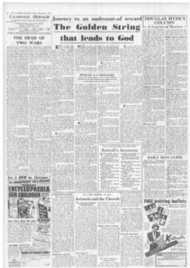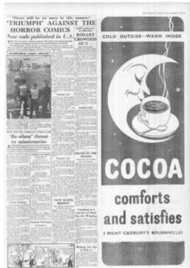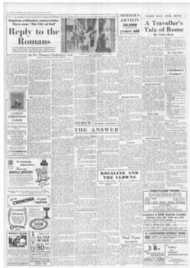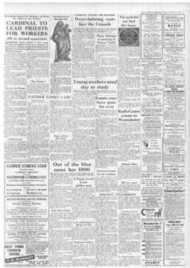Page 3, 5th November 1954
Page 3

Report an error
Noticed an error on this page?If you've noticed an error in this article please click here to report it.
Tags
Share
Related articles
Personalities From The Past That Rouse A Young Mind
Butler Did It
Hammer And Sickle
Desmond Albrow
Fr. Charles-roux Identified
SPIRIT OF TWO WARRIORS AND AN ARTIST
"ENERAL Gordon," by Lord GElton, and "His Country was the World," by Charles Beatty, are both biographies of one of the most eminent of eminent Victorians, Charles George Gordon, who was a Field-Marshal in both the Turkish and the Chinese Armies while still a half-Colonel in the British, and who was a legend as much for his saintliness as for his soldiership even during his own lifetime. Both books are recommended by the Book Society, and not without justification in both cases.
When Gordon was killed by the Mandi's dervishes in the Palace in Khartoum on January 26, 1885, it was the signal for an almost universal outburst of dismay, consternation and disgust. It was led by the Queen herself, who hurried, pale and trembling. from her residence at Osborne to the cottage occupied by Sir Henry Ponsonby a quarter of a mile away, to announce to a surprised and frightened family : "Too late, too late." So much was Gordon in the mind of everybody.
The spate of biographies that followed, accurate and inaccurate, were alike composed in a mood of ecstatic reverence. The "debunkers" of the 20th century for the most part left Gordon alone. Only the hest known of them, Lytton Strachey, in what Lord Elton calls "a characteristically feline and unfounded innuendo," suggested that Gordon was a drunkard.
Lord Elton deals more fully than it really deserves with this hit of nonsense; but he is specially interested in Gordon's spiritual development and achievement. One feels that the historian has the edge on the story teller and philosopher in presenting a full and rounded picture of one of the greatest of English "eccentrics."
Charles Beatty's book, commendable as it is, is, indeed, more a study than a full historical judgment. But he, too, hits on the note of eccentricity, absurdity : "Surely it is for his panache, his incorrigible integrity. that Gordon is memorable. it is
greater than his absurdity. greater than his tragedy . . . Gordon tried so hard to love his brother and could not, because he despised himself e' As if that mattered.
BURNISH up the cliches for RearAdmiral Chalmers' life of Sir Max Horton, Commander-In-Chief, Westem Approaches, from November. 1942, to August, 1945, for they all come true again. This is a book that is "difficult to put down." and which if I had had the leisure, 1 should have "read at a sitting," for the story is _a sea story. an adventure story, an epic story and a success story.
The hero. a first-class sailor, a submarine man, a highly efficient technical and administrative officer, is an admiral with a difference—namely that as a comparatively young naval officer he was prepared "to think and think" about the works of St. John of the Cross. and who. as Vice-Admiral Commanding Northern Patrol in the first three days of the war. wrote from sea : "1 have the medal of St. Therese of Lisieux in my pocket now and she never leaves me."
Fr. Martindale writes a charming epilogue on the man as a conclusion to a first-class biography. welI documented and indexed.
TRISTRAM HILLIER is one of England's most outstanding living artists, and Leda Ihis wife's name] and tho.Goose is his autobiography. It shows that had he turned his mind to depicting things in words rather than in lines or colours. he would in all probability have won an equal measure of success.
The clarity which is one of the
most conspicuous qualities of his painting is also a mark of his writing. He has led, too, an unusually interesting and varied life. He was born in Peking, where his father was a banker, came to England with his mother at the age of six months and was educated at the early Downside.
He made a journey while still a boy by the Trans-Siberian Railway to visit his father, when he still cherished an ambition to become a monk and go the whole hog by entering a Trappist Monastery.
He was sent by his father to visit a Trappist Monastery in China, a journey which was an adventure in itself. before the monastery chilled the fervour of his "vocation." Stories of life in France, and Spain, and in the art schools of London, too, for that matter. have a liveliness that make the whole book most rewarding.
It is also the story of a loss and return to the Faith that is far more convincing than many; for Hillier says "one can lose it in the same way as one loses one's fortune or one's collar-stud—by not taking care of it."
blog comments powered by Disqus




